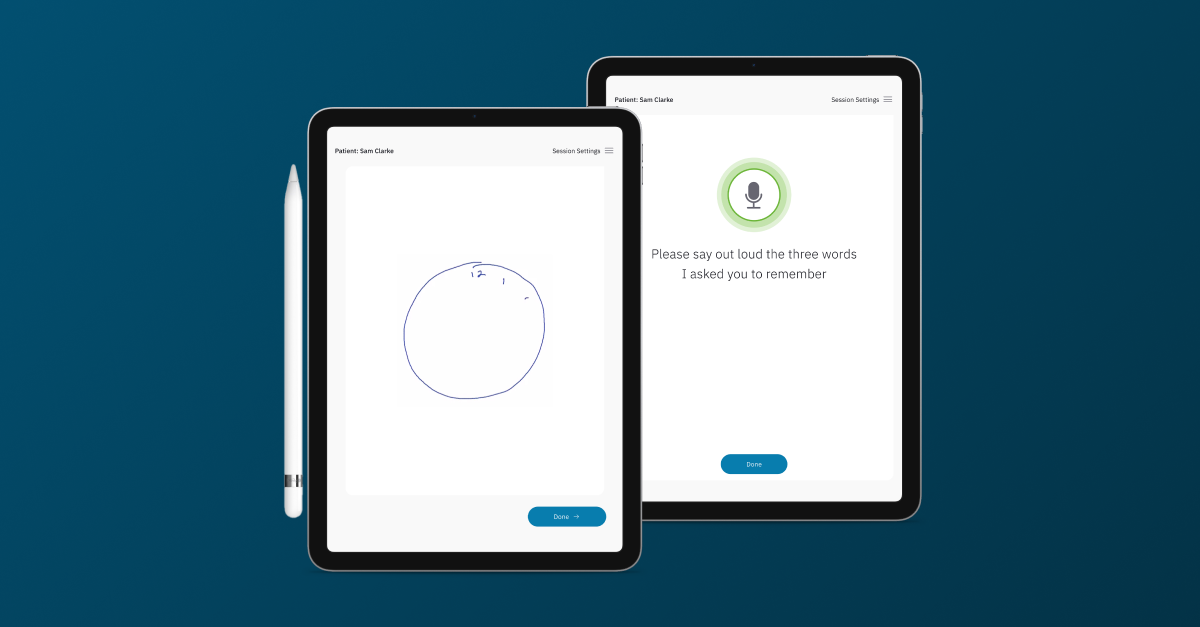Boston, MA and Amsterdam, NL – July 18, 2023 – Linus Health, a digital health company focused on enabling early detection of Alzheimer’s and other dementias, today announced that company leaders and collaborators are presenting results from eight new studies involving its digital cognitive assessment solutions at the 2023 Alzheimer’s Association International Conference. The results not only further validate Linus’ AI-enhanced technology’s ability to outperform paper-based cognitive tests in detecting mild cognitive impairment (MCI) and dementia and help identify underlying causes, but also demonstrate its transferability from research to clinical practice.
Building on its award-winning DCTclock™ test, Linus Health introduced its next-generation digital cognitive assessment, the Digital Clock and Recall (DCR™) in 2021. The DCR combines DCTclock with word recall tasks and is part of a growing set of assessments and questionnaires available on the company’s research platform. It is also a core component of Linus’ clinical platform launched at AAIC last year, which expands on assessments with actionable clinical guidance and lifestyle-based patient action plans to help primary care clinicians identify, triage, and manage cognitive issues early.
These newest studies showcase the technology’s ability to deliver rich insights into brain health beyond cognitive function alone, with additional data related to a key Alzheimer’s disease (AD) biomarker (PET amyloid) and new data pertaining to functional impairment. As researchers and clinicians alike look to maximize efficiency in assessing cognitive performance, tools that can provide multi-faceted insights in just a few minutes will be increasingly essential.
Featured studies being presented at AAIC include:
- Comparative Performance of the Digital Clock and Recall Test, Montreal Cognitive Assessment, and Saint Louis University Mental Status Among Patients in Primary Care - conducted with researchers at Indiana University School of Medicine – as part of its role as a flagship site in the Davos Alzheimer’s Collaborative’s Healthcare System Preparedness Project – this study looked at the role digital cognitive assessments can play in enabling efficient screening in primary care. 114 people that the DCR found cognitively impaired or borderline impaired were also given two common screening tests, which yielded concordant results, thus supporting the DCR’s use as a feasible, faster option for detecting cognitive impairment.
- Combined Digital Clock Drawing Test and Delayed Word Recall and Their Relationship with PET Amyloid Biomarker Status in Cognitively Unimpaired Older Adults - DCTclock was previously shown to be associated with amyloid, as published in Neurology; this new study, with 159 participants, found that combining DCTclock and a delayed recall task – as the DCR does – accurately classified PET amyloid-beta biomarker status among most cognitively unimpaired people, reinforcing the DCR’s use in supporting clinical decision-making for individuals with early stage AD and other dementias.
- Prediction of Functional Dependence with Digital Clock Drawing, Word Recall, and Assessment of Lifestyle and Health Factors – distinguishing MCI from early dementia requires understanding the clinical impact of cognitive deficits on a patient’s activities of daily living (ADLs). This study of 825 participants showed that Linus’ Core Cognitive Evaluation (combining the DCR with a lifestyle questionnaire) results were strongly associated with levels of functional impairment that characterize and differentiate MCI and early dementia, expanding the utility of this assessment in primary care.
“Recent developments on the AD treatment front further illuminate the need to not only help clinicians and researchers identify the presence of cognitive dysfunction early, but also more efficiently understand the nature and impact of that dysfunction,” said Alvaro Pascual-Leone, MD, PhD, Chief Medical Officer at Linus Health. “These new studies underscore the role AI can play in maximizing the insights available from brief, accessible, easy-to-administer cognitive assessments.”
This year’s AAIC conference is being held in Amsterdam from July 16-20th. Linus Health is exhibiting in booth number 617. For a full view of all studies involving Linus Health at the event, click here. If you would like to book time to meet with a researcher involved in these studies, contact Karina Stabile at kstabile@ariamarketing.com.
About Linus Health
Linus Health is a Boston-based digital health company focused on transforming brain health for people across the world. By advancing how we detect and address cognitive and brain disorders – leveraging cutting-edge neuroscience, clinical expertise, and artificial intelligence – our goal is to enable a future where people can live longer, happier, and healthier lives with better brain health. Linus Health’s digital cognitive assessment platform delivers a proven, practical means of enabling early detection; empowers providers with actionable clinical insights; and supports individuals with personalized action plans. We are proud to partner with leading healthcare delivery organizations, research institutions, and life sciences companies to accelerate more proactive intervention and personalized care in brain health. To learn more about our practical solutions for proactive brain health™, visit www.linushealth.com.
